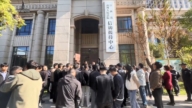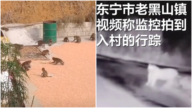【新唐人2014年04月16日讯】历经去年狂涨的中国楼市,今年第一个季度,却出现房价同比与环比涨幅连续缩小。尽管开发商推出各种手段促销,房市增长仍显疲态。如果今年房价继续下跌,中国的楼市会崩盘吗?国内房价涨跌对富有阶层有何影响?谁是房价下跌的最大受害者?让专家告诉你。
美国《华尔街日报》报导,三月的“中国发展高层论坛2014”年会上,有业内专家学者认为,中国一、二线城市的房价与三、四线城市要区分看待,房价回落不是泡沫破裂,中国楼市不会崩盘。
大陆金融分析师任中道则表示,近期大陆房市五花八门的降价促销,已经说明了房地产前景不妙。而一、二线城市的房价和三、四线区分看待,是基于热点城市需求的不同而言。
大陆金融分析师任中道:“如果房地产中共认为让它崩的话,那它就会崩﹔如果说不让它崩,它会用举国之力去加速的印钞票,或者用财政、银行去填这个窟窿,这是中共一贯作风。”
大陆民间经济学家郑先生:“情况非常严峻,房地产的风险在中国一开始就存在很多,它的崩盘是一个复杂的系统概念。”
据大陆《财经网》报导,受信贷收紧和自住型商品住房政策的影响,4月的第一个星期,3月31号到4月6号,北京住宅市场,包括新建商品住宅和二手住宅网签总量为2587套,同比下调22% 。
3月份,北京二手房成交均价为每平方米3万1400元,环比2月份再次下调0.6%。而成交套数为8943套,创造2009年以来同期的最低值。
而有“北京后花园”之称的河北省秦皇岛楼市,有楼盘降价40%求甩货,大量库存积压下,可能出现鬼城的隐忧。而在浙江杭州一处楼盘,单套房价格就下跌近百万。
面对继续下跌的房价,谁是这个泡沫破灭的最大受害者?
大陆《财新网》英文版援引“西南财经大学”的《中国家庭金融调查》的报告结果指称,房价下跌对中产阶级家庭打击很大。
不过,中国金融智库研究员巩胜利表示,中国的中产阶级目前来讲占的比例不是很大。
中国金融智库研究员巩胜利:“最大的是穷人,中国穷人大概是5亿左右,这个水平是怎么划分的,就是人均以每天1美元这个水平,再加上稍微勉强能维持生计的那部分人,大概有5亿人,中产阶级大概只有3亿人左右。”
大陆民间经济学家郑先生也认为,所谓的中产阶级是很有限的,广大的中产阶级大部分是社会底层,而且他们买房是自己住。
任中道表示,因房地产受打击的,或许是那些能真正拿出100万以上现金买房的所谓中产阶层,但他们仍是中国经济体制下的一个群体。
任中道:“受害者那肯定是老百姓,有的房子一夜之间损失了50万市值,都有这样的新闻出现。”
那么,国内房价涨跌对富有阶层有何影响?
任中道:“对这些人的影响是没那么大是因为很多的富人都移民了、资产也转移了,并且所有的中共这些权贵阶层,他们对信息的来源、政策的把握比一般的民众更加敏感快速。”
今年1月,胡润研究院公布的调查显示,中国富豪移民比例升高到64%,其中亿万富豪有1/3移民到国外。
《华尔街日报》1月曾援引中国与全球化智库(CCG)调查的数据,过去23年内中国海外移民存量增长了128%,截至2011年,已有2万8000亿元的资产已经转移到海外,约占当年中国国内生产总值GDP的3%。中国人已成为美国第二大海外房地产买家。
采访编辑/易如 后制/萧宇
Who Are the Biggest Losers of China’s Real Estate Bubble Blow-out?
China’s housing prices soared last year.
In Q1, 2014, the increase slowed down year-on-year and
period-over-period basis.
Although developers introduced various means of promotion,
the housing market growth continues to show down.
If prices continue to fall this year, will China’s property
market collapse?
What will be the impact on the wealthy?
Who will be the prime victims of falling house prices?
U.S. Wall Street Journal reported,during March’s 2014 that,
China Development Forum,experts indicate that China’s 3rd
and 4th level cities are different from the 1st and 2nd level cities.
Housing price falling does not mean a bubble burst.
China’s real estate market will not crash.
China’s Financial Analyst Ren Zhongdao expressed that
recent promotions of the housing market indicate unpleasant
prospects for the real estate market.
The difference between levels of cities is actually about the
difference in demand for housing.
Ren Zhongdao: “If the Chinese Communist Party (CCP)
allows the real estate market to collapse, it will collapse;
If the CCP does not want real estate to crash,
it will speed up printing money using the resources
of the whole nation to fill up the gap.
This is the CCP style."
Economists Mr. Zheng: “The situation is very serious.
There are many risks in China’s real estate at the beginning.
Its crash is a complex system collapse."
According to China’s caijin.com,impacted by credit tightening
and owner-occupied commercial housing policy,
in the first week of April, March 31 to April 6, there were 2,587
transactions in the Beijing residential market,
including new and second hand houses, down 22% year on year.
In March, Beijing second-hand housing price was 31,400 yuan
per square meter, down 0.6 percent from February.
There were 8943 transactions the lowest since the same period
in 2009.
Qinghuangdao is referred to as the “Back Garden of Beijing."
Some houses there dropped 40%.With a large backlog of
inventory It might become a ghost town.
In Hangzhou, the price of a single unit fell nearly a million yuan.
With prices continuing to fall, who are the biggest losers of
this bubble blow-out?
Caijing.com English site cited Chinese Household Financial
Investigation by Southwest University of Finance,
“Falling house prices heavily hit the middle-class."
However, China’s financial think tank researcher Gong Shengli
said the proportion of China’s middle class is not high.
Gong Shengli: “The biggest victims are the poor, about
500 million people who earn $1 dollar per day per capita
and those who barely make ends meet.
The middle class is about 300 million people. “
Mr. Zheng also thinks that the so-called middle class is limited.
The vast majority of the middle class is at the bottom of society,
and they buy houses for their own living.
Ren Zhongdao: Middle-class who can spend one million yuan
cash to buy houses are hit by the house market.
They are a separate group of China’s economic system.
Ren Zhongdao: “For sure the victims are the people.
Some houses lost 50,000 yuan market value in one night.
There is news like that."
What will be the impact of falling house price on the rich?
Ren Zhongdao: “The impact on these people is not too much.
Many of the wealthy have emigrated and transferred their assets.
This CCP high-level group has sources of information
and react much faster than the general pubic."
In January 2014, Hurun Research Institute published a survey
indicating that the emigration ratio of rich Chinese people rises
to 64%,
with 1/3 billionaires emigrating out of China.
In January Wall Street Journal cited data from the
Center for China And Globalization (CCG),
in the past 23 years China’s emigration increased 128%.
As of 2011, more than 2,800 billion yuan worth of assets
have been transferred overseas, about 3% of China’s GDP of 2011.
Chinese have become the second largest foreign real estate
buyers in the U.S.
Interview & Edit/Yi Ru Post-Production/Xiao Yu




























